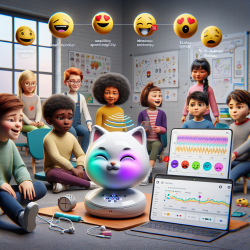As a Special Education Director, you're always on the lookout for ways to enhance your practice and support your team. The recent research titled "Access to Procedural Memories After One Year: Evidence for Robust Memory Consolidation in Tourette Syndrome" provides valuable insights that can be applied to improve therapeutic strategies and encourage further research.
Key Findings from the Research
The study focused on the short-term (5-hour) and long-term (1-year) consolidation of procedural memory in children with Tourette Syndrome (TS) compared to neurotypical peers. Here are the key findings:
- Probability-Based Information Retention: Both children with TS and typically developing children successfully retained probability-based information after both short-term and long-term offline periods.
- Comparable Performance: The performance in retaining probability-based information was comparable between children with TS and their neurotypical peers.
- Serial-Order Information: The study did not find significant acquisition of serial-order information in either group, making it difficult to assess its consolidation.
Implications for Practice
These findings have several implications for your practice:
1. Enhanced Learning Programs
Given that children with TS can retain probability-based procedural information effectively, consider incorporating more probability-based learning activities in your programs. This could involve:
- Interactive Learning Modules: Use online platforms to create interactive modules that emphasize probability-based learning.
- Gamification: Introduce games that require children to predict outcomes based on probability, which can help in retaining procedural knowledge.
2. Tailored Interventions
The comparable performance between TS and neurotypical children suggests that interventions designed for neurotypical children might also be effective for children with TS. However, customization based on individual needs is crucial. Consider:
- Individualized Education Plans (IEPs): Ensure that IEPs are tailored to include probability-based learning activities.
- Regular Assessments: Conduct regular assessments to monitor retention and adjust interventions accordingly.
3. Support for Therapists
Given the ongoing therapist staffing shortages, online therapy services like those provided by TinyEYE can be particularly beneficial. Ensure that therapists are:
- Trained in Online Platforms: Provide training for therapists to effectively use online therapy platforms.
- Supported with Resources: Offer resources that align with the latest research findings, helping therapists implement evidence-based practices.
Encouraging Further Research
While this study provides valuable insights, it also highlights the need for further research, especially in understanding the consolidation of serial-order information. Encourage your team to:
- Stay Updated: Regularly attend conferences, webinars, and read publications to stay updated on the latest research.
- Collaborate: Foster collaborations with researchers to explore new areas of study and implement findings in practice.
- Share Insights: Create forums or discussion groups where therapists can share their experiences and insights from applying research findings.
Conclusion
Implementing the findings from this research can enhance your practice and support the children in your district more effectively. By focusing on probability-based learning and providing tailored interventions, you can make a significant impact. Encourage your team to stay informed and collaborate on further research to continue improving therapeutic strategies.
To read the original research paper, please follow this link: Access to Procedural Memories After One Year: Evidence for Robust Memory Consolidation in Tourette Syndrome.










